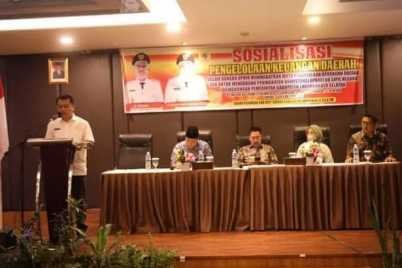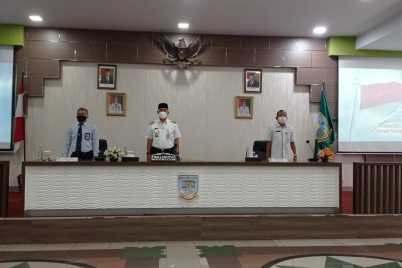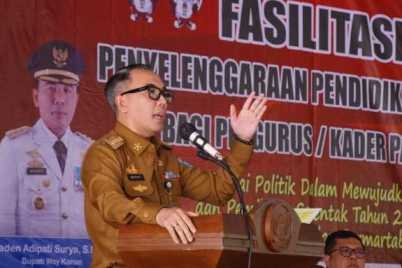By: Hadi Hadiyuwono
Benuanews.com- Indonesian Foreign Minister Retno Marsudi welcomed British Foreign Secretary Liz Truss on Thursday, November 11th, to discuss a closer cooperation between the two countries.
The visit by Truss was a part of the efforts by the British Government to deepen the collaboration with Southeast Asian countries after leaving the European Union (Brexit). Citing the press release from the Indonesian Foreign Ministry, the meeting included the discussion on collaboration in areas such as future technologies, cybersecurity, and economic relations, as well as recent regional and global issues. Despite the importance of these topics, there were other important issues that were particularly missing from the agenda, one of them was the topic of human rights in Indonesia.
This missing agenda was particularly noticeable, because the topics on democracy and human rights in Afghanistan and Myanmar were present in the discussion. Moreover, the meeting was held not long after the Guardian released an article on the involvement of the British Foreign Office in the misinformation campaign that incited the mass massacre in the aftermath of failed coup d’état by Indonesian Communist Party (Partai Komunis Indonesia, PKI) in 1965 (“Slaughter in Indonesia: Britain’s secret propaganda war”).
The mass massacre targeted those who were allegedly linked to the coup d’état and PKI, in which a considerable number of innocent people also became victims, and it triggered a human rights crisis in Indonesia. Given that the news has just recently been reported and was gaining public attention, and especially it was on the British involvement in an incident that triggered a human rights crisis in Indonesia, it was expected that the issue would be brought up during the discussion. Therefore, it was particularly noticeable when the issue was missing.
From the point of view of the British Government, skipping the discussion on this matter might have served their purpose well. Brexit had limited their flexibility in their economic collaboration with the European Union and thus left them economically vulnerable.
A collaboration with Indonesia, which boasts the fourth largest population in the world and is a present and future economic powerhouse, would provide an economic boost in the form of potential export destination.
Including sensitive topics such as human rights issues in the discussion, especially after the British involvement in the 1965 Indonesian massacre being exposed, would make the Indonesian government take a more cautious stance while conducting the discussion on future collaboration, and the discussion would not proceed as smoothly as the British Government would have expected. Therefore, even though it was a good chance for the British Government to show their willingness to apologize on the issue, it made sense that they tried to avoid the subject. On the other hand, it made no sense that
The Indonesian Government also avoided the subject. The Indonesian Government, on this occasion Marsudi, should view this meeting as a good opportunity to discuss the involvement of the British Government in the massacre and how to resolve the issue.
This is because as has been mentioned earlier, the British involvement in the massacre had just been revealed recently, and the news is still fresh on the public mind. Given that there was still no official response from the British Government regarding the revealed documents, it was a good time to push them in addressing the issue and demand for apology. Moreover, the misinformation propaganda which incited the massacre was done by Information Research Department (IRD), which was the British Foreign Office’s cold war propaganda arm, therefore, Truss, as the foreign secretary, should have been briefed about the matter and would be able to discuss it with the Indonesian side to resolve the issue.
Based on these considerations, Marsudi should have taken the opportunity and raised the issue during the meeting to remind the British Government of their responsibility in the incident. She should have demanded a formal apology from the British Government, while a complete investigation by the British Government on the extent of the involvement in the incident should also be requested. It was a wasted opportunity that she did not raise the issue during the meeting.
The negligence to raise the issue was a disrespect to the human rights efforts in Indonesia as a whole, and to the families of the 1965 Indonesian massacre victims in particular.
This is because during the meeting, Marsudi still had the time to discuss human rights issues in other countries. She reiterated Indonesian commitment to continue their support to help the people of Afghanistan, and also expressed her view on the need to bring back democracy and ensure the safety and well-being of people of Myanmar. Therefore, it would have been fitting if she also brought up the involvement of the British Government in the 1965 Indonesian massacre and demand for apology and resolution.
To make up for this missed opportunity, it will be wise for Marsudi to reach to the British Government and demand for their formal apology and necessary steps to resolve the issue as the follow up of the meeting.
She should point out that even though the agreement on the future collaboration between Indonesia and the United Kingdom is a good conclusion for the meeting, a good collaboration could not be achieved without a mutual trust between the parties involved. It will be difficult to reach a mutual trust if the previous incidents between the two countries, including the involvement of the British Government in the 1965 Indonesian massacre, still not being resolved.
This is especially important given the fact that the documents related to the massacre were held far beyond the 20-year rule for classified documents, which does not indicate a good intention by the British Government.
She should also remind the British Government that the Indonesia-UK Strategic Partnership established in 2012 was based among others on support for sovereignty and territorial integrity, and the involvement of the British Government in Indonesian internal affairs which resulted in mass massacre was a breach of sovereignty integrity.
In addition, the Indonesian Government as a whole needs to pay more attention to the current political issues and information, so that a missed opportunity like this can be avoided in the future.








